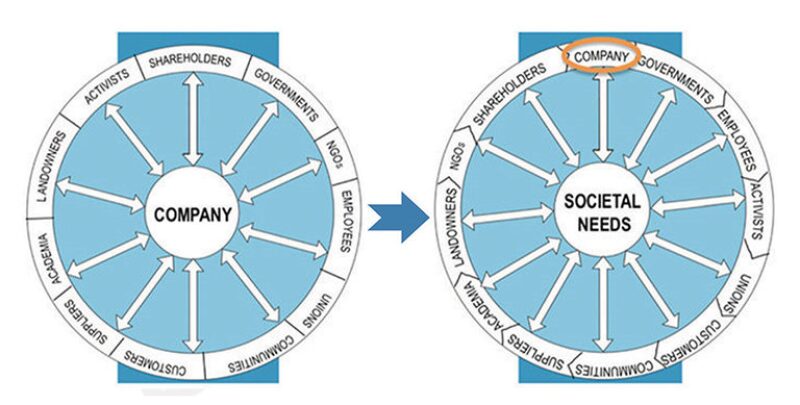
The SPE Strategic Plan 2018–2023 calls for claiming pride in our industry’s higher purpose, that of supplying energy to meet the needs of humanity. The industry has been vital to global well-being long before the concept of corporate social responsibility (CSR) was coined. CSR is a key way that business can address stakeholder concerns that are beyond its core KPIs—the relationship between business and the long term; between business and the development of the communities and countries within which they operate successfully; between business and pressing social problems such as poverty alleviation, capacity building, education, health, local economy, and the environment.
I have traveled the world this year promoting sustainable development in our industry and learning about our industry’s accomplishments. I am impressed, yet I can see that we need to think even bigger and better about our role in society, and in history. While the use of our products has raised living standards for billions of people, the pace of human development is having detrimental impacts on nature. Our industry not only applies its ingenuity and innovation to addressing its own impacts, but also actively participates in global efforts to tackle some of the world’s most significant sustainability challenges. As the source of more than 50% of the world’s energy, the scope of our opportunities, and our responsibilities, is huge.

CSR grew from man’s impact on his surroundings—people and nature. The term is vigorously discussed, disputed, and frequently substituted by other terms. Semantic nuances and sensibilities matter, and they reflect the different cultures, drivers, and contexts in which business is conducted. A widely accepted definition is the one crafted by the World Business Council for Sustainable Development: “Corporate social responsibility is the continuing commitment by business to behave ethically and contribute to economic development while improving the quality of life of the workforce and their families as well as of the local community and society at large.” The concepts and practices engendered by that definition are now central to how business is conducted. It also aligns well with SPE’s definition of sustainability.
Christiaan Luca, a 2018–2019 Distinguished Lecturer, has devised a model that graphically illustrates the clear shift in perspective required to access the benefits of CSR—a society-centric view of the world with one’s company as one stakeholder in society amongst many vs. a company-centric view of the world (JPT April 2018).
Introduction of the UN 17 Sustainable Development Goals (SDGs) was a turning point for CSR. Adoption of the SDGs by governments, civil society, and industry exceeded all expectations and have clearly taken center stage. Many companies are committing to these goals, mapping their connection to them, and building strategies to contribute to their realization. One expert recently suggested they provide the perfect compass by which to set a company’s purpose north star (IPIECA Oil and Gas Industry SDG Atlas).
Trust is a core component of any governance system and one could argue that CSR is a form of governance of a company’s relationship with society. The 2019 Edelman Trust Barometer reveals that trust has changed profoundly in the past year—people have shifted their trust to the relationships within their control, most notably their employers. Globally, 75% of people trust “my employer” to do what is right, significantly more than nongovernmental organizations (57%), business (56%), and media (47%).
So where does CSR sit in this new galaxy of concepts and practices? Does it still have a role to play? I believe so—CSR is very much alive and it requires a specific set of competencies. It is starting to reach the level of management systems integrating policies, guidelines, and training into every aspect of how we run our businesses. Just as we took years to realize that HSE is everyone’s job or being ethical is everyone’s job, we are now realizing that practicing CSR needs to be a way of running a successful business. I am proud that the SPE counts some of the finest industry HSE and CSR/sustainability practitioners amongst our members.
So much of what is achieved through CSR remains invisible, so to have some flagship examples of good practice to point to is encouraging. I have seen some great examples during my tenure as SPE President. First amongst them is the SPE Cares program, which falls into the philanthropy category of CSR—I commend our members around the world for their engagement. Visiting these sections and chapters, and listening to their members, I can see their passion and conviction. Indeed, they are our heroes.
There is no source to quantify the CSR performance of our industry. To illustrate our impact, I have chosen noteworthy examples from national, international, and service companies, which demonstrate the CSR spectrum as shaped by the different cultures, drivers, and contexts in which business is conducted.
My employer, Saudi Aramco, has had a CSR program since the early 1930s, when Standard Oil of California (the mother of today’s Saudi Aramco) started exploring for hydrocarbons in Saudi Arabia. Through its 80-plus years of history, Saudi Aramco has built schools, hospitals, roads, communities, universities, vocational institutes, wildlife sanctuaries, industrial complexes, seaports, and more. The company’s activity, through its core business and its CSR projects, has clearly enabled my country’s development and the prosperity of my compatriots. I am certain the same can be said for many other national oil companies and their own countries.
Four recent Saudi Aramco multibillion CSR programs with great national and international impact worth mentioning are:
- King Abdullah University of Science and Technology (KAUST) with the vision to advance science, engineering, and technology based on research locally, regionally, and internationally
- King Abdullah Petroleum Studies and Research Center (KAPSARC) to advance petroleum studies, energy policies, and environmental research
- King Abdul-Aziz Center of World Culture (Ethra), attracting more than 1.5 million visitors per year to promote and accelerate Saudi potential by encouraging creativity, inspiring minds, and empowering talents
- Shaybah oilfield wildlife sanctuary, a safe haven for migratory bird species, plants, and animals in the Empty Quarter in the Arabia peninsula next to Shaybah oil field, with production capacity exceeding 1% of global daily oil production.
Another capacity-building CSR example worth highlighting comes from Total in Myanmar—the Yangon Technological University, which now boasts 12 engineering departments, a research center, 47 laboratories, and currently educates 2,000 students.
As HSE has become embedded in our industry’s culture, it is a natural focus for CSR activities. The Schlumberger “HSE for Youth” program engages both the children of employees and of their communities in learning to manage the risks they face in their daily lives. A student of that program saved the lives of her classmates by insisting they wear their seat belts before departing on a school bus trip. An accident ensued and all escaped with minor cuts and bruises. Chevron, ExxonMobil, and other companies fund extensive programs fighting malaria, HIV/AIDS, and tuberculosis, and support local health workers and agencies, especially in Africa.
These are just few examples of how our industry serves societies and communities around the world. During OTC 2019 in Houston, panel sessions discussed how the SDGs and the CSR worldview are informing government efforts to deal with the major changes created by resource discoveries in countries such as Guyana and Ghana. I regret that I can mention only a few of the numerous CSR programs across our industry. Small to large, their impacts can be significant. This should be a source of pride for all of us.
I am also very glad to see CSR culture propagating into academia and energy research centers. I had the honor to participate in inaugurating the University of Houston (UH) Energy Center CSR initiatives in January. According to its website, the following have the biggest potential for advancing the practice of CSR in the energy industry:
- The business case for how CSR can improve the bottom line
- Establishing processes and rubrics for implementing CSR
- Developing performance metrics for internal measurements and external reporting
- Training for entry, mid-career, and executives and establishing career paths for CSR professionals
- Establishing a community of energy-industry-focused CSR professionals
I embrace this approach and encourage each of you to support these initiatives. CSR is reported annually as part of many companies’ sustainability reports. I encourage the quantification and aggregation of industry’s efforts so we can evaluate if we are contributing fast enough to the resolution of the global social challenges facing our extraordinary planet—our home.
Let us embrace the concept that our industry’s mission is not limited to providing energy to support the global economy, but also to improving human lives. I am very proud of being part of this industry. Are you?

